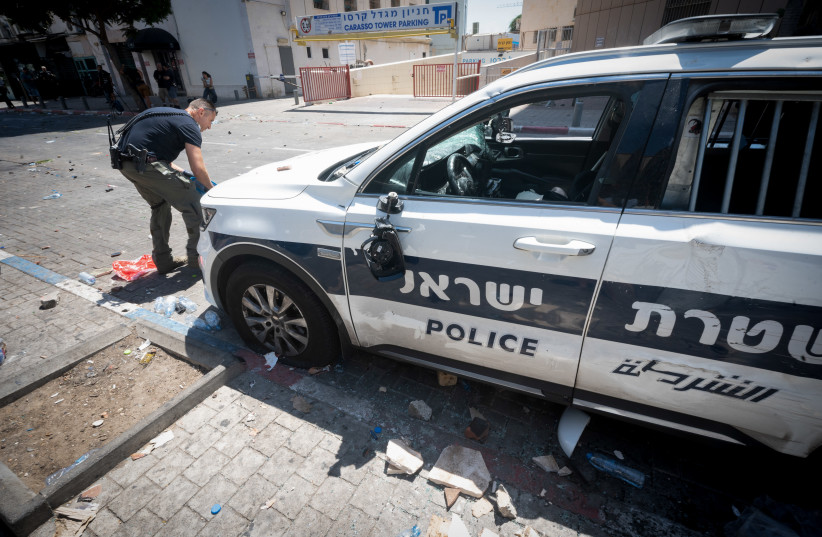In recent months, the Israel Police has been publicly, and likely unintentionally, telling the Israeli public and leadership that they are unable to do their job. In a number of incidents, they have described an inability to protect Israel’s citizens in tense environments without resorting to violence, and have admitted to using tactics that endanger the public.
An Israel Police officer shocked Israelis two weeks ago when he said to protester Itamar Alroey, “I will rape your mother.” The incident, caught on video that quickly became viral, amplified the public’s discussion of police violence, which has become more mainstream as more Israelis participate in protests and are exposed to it.
Some Israelis were not shocked by the statement because this isn’t the first time it has been made by an officer to a protester. A cop also threatened protester Amitai Aboudi, whose violent arrest made headlines last summer, that he would rape his mother.
The Israel Police condemned the threats that were made against Alroey and caught on film.
“The policeman’s conduct at the scene is not in line with the norms of discourse and conduct expected of every policeman, even in turbulent situations of this kind, so it will be examined and dealt with accordingly.”

The statement, while reassuring in its condemnation of inexcusable police violence, also raises the question of why they felt the need to temper their reproof by mentioning that the incident occurred at a protest – a naturally turbulent environment.
Police officers, by virtue of the profession, often work in environments of extreme turbulence. They are tasked with protecting citizens in the midst of some of the worst situations that exist – in mass shooting events, during terrifying fires, and in violent domestic disputes.
Protests are another environment in which police must work and which will often be chaotic or emotionally charged.
At a May Knesset National Security Committee meeting on police violence at protests, Cmdr. Gilad Bahat also referenced the difficulty police seem to be facing handling demonstrations.
“Police are not always perfect. If there are mistakes, they should be examined,” he said. Police are doing the maximum, but “you must understand that this is a very complex task,” he told the committee.
Police utilization of horses
One of the tools used to police protests are horses, and there have been a number of incidents where this led to protesters getting injured.
One case that made headlines was an April 2023 incident in which Yael Reuveni, a protester on the Ayalon Highway, was whipped repeatedly by mounted police officer Shai Peretz.
Peretz was indicted by the the Justice Ministry’s Police Investigation Department for this incident on charges of attack.
In his examination, according to quotes published by Haaretz, Peretz gave a worrying account of his control over his police horse, and with it, his ability to do his job.
When explaining why he whipped Reuveni, Peretz said he felt she endangered him because her actions made him afraid he would lose control of his horse – which endangered not only him, but those around him.
“I have control of the horse, but it is not absolute. At the end of the day, it is an animal and has unpredictable behavior. It is a miracle that this didn’t end with a 600 kg. [horse running] into the crowd.”
His message was echoed by the commander of Israel’s national mounted police unit, who Haaretz said is one of the Israel Police’s most experienced officers when it comes to use of police horses.
This raises a question related to the previous one: If mounted police are not able to control horses in protests – if, as they say, this control is impossible – why are they still using horses at protests?
It is another case in which police are admitting to failing to do their job – protecting Israel’s citizens, while enabling them to exercise their basic human right to protest.
The Israel Police is raising a red flag. They are admitting that they are unable to do their job professionally in the context and manner in which they are needed.
Our police are given the power of life and death over us. They are armed and sent out among citizens to protect, serve, and maintain public order. They will always be tasked with working in challenging environments by the very definition of their work.
When it comes to operating in protests, which will always be charged environments but are necessary in a democracy, police are making excuses for their violence and using tools that they have admitted endanger protesters.
Israel’s political leadership, its legislative branch, must address this to provide more solutions. Whether through bigger budgets for better training, programs to make the police profession more enticing, or better oversight and real consequences for violent or negligent officers, Israel’s leadership must address this problem.
Public unrest has become a part of daily life in Israel, with hardly a break between the years of massive protests the country has seen. Police violence has also been a problem at protests in the haredi and Arab sectors for years.
Protest is a most basic human right. A police force that enables protest is not optional, it is necessary, and Israel’s leadership must find a way to supply citizens with one.
